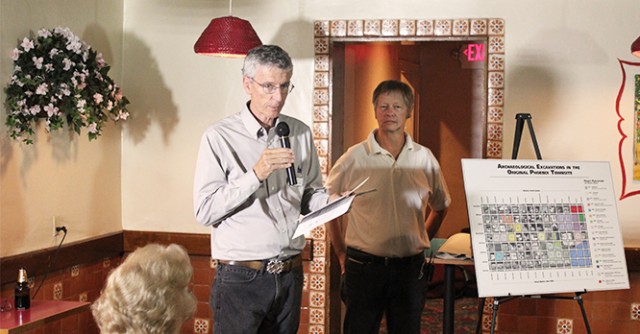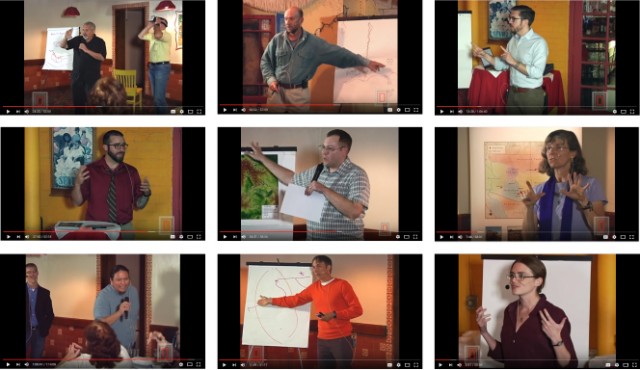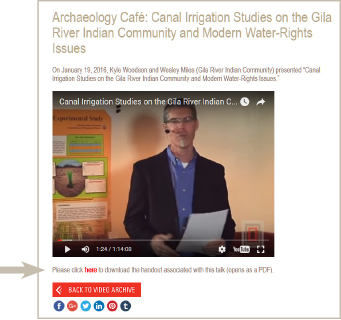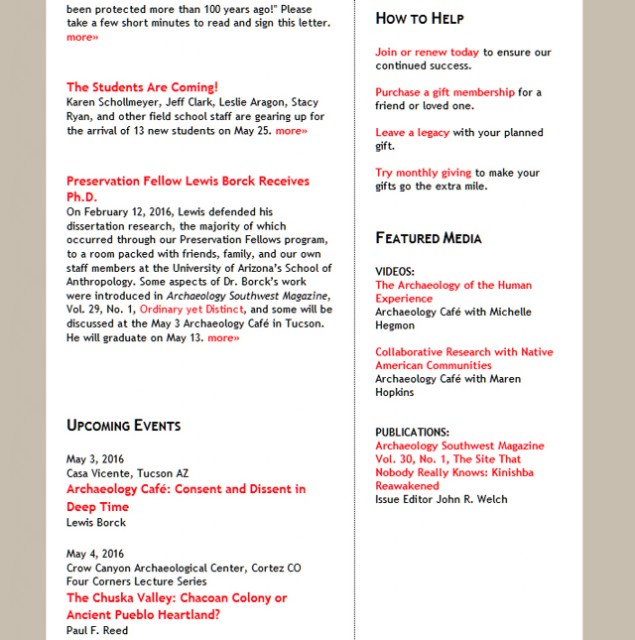- Home
- >
- Preservation Archaeology Blog
- >
- Archaeology Café Returns

(September 22, 2016)—Autumn has always been my favorite season. Transplanted to Tucson from Chicago 25 years ago, I’ve come to appreciate the more subtle signs of the season here—raking light, denser traffic, Halloween costume ideas that don’t incorporate a coat…
And, for the past eight years, autumn also means Archaeology Café. Yes, believe it or not, we’ll be convening for the ninth season in Tucson and the fifth in Phoenix. Seeing all the videos on our YouTube page kind of blows my mind. (So does having a first-grader in my house, but that’s another story.)

As you’d imagine, a lot of planning and legwork goes into producing a season of cafés, and your feedback in our annual surveys is critical to that process. We captured feedback informally and through an online survey via SurveyMonkey. People were notified of the survey and its URL at the last two meetings of the season, in our weekly and monthly email, via Facebook, and via Twitter. One hundred and seventy-six people responded. THANK YOU for taking a few moments to share your thoughts.
For seasons that were supported, in part, by funds from Arizona Humanities, we submitted formal reports summarizing activities, audience evaluation, and lessons learned. I’d like to share some highlights from our report on the 2015–2016 season, and also respond publicly to some of the frustrations people have shared with us.
What is Archaeology Café? Why does Archaeology Southwest offer the program?
Archaeology Southwest explores and protects the places of the past. Through programs such as Archaeology Café, we invite the public to come along with us. We strongly believe that when people find meaningful connections to the past and to the histories of indigenous peoples, they become advocates and allies for respectful treatment and protection. They also support ongoing research and outreach conveying what experts are learning. This is at the core of all our activities, not just public outreach.
Typically, we ask speakers to consider the “big picture”—the “so what?”—and convey the value of archaeological and anthropological research to the broader taxpaying public.
In Tucson and Phoenix, we begin gathering after 5:00 p.m. for no-host refreshments and socializing. Presentations generally begin at 6:00 p.m. and end at about 7:00 p.m. In Phoenix, we meet at Macayo’s Central. In Tucson, we meet at Casa Vicente Restaurante Español. This season, Tucson cafés will be held on the first Tuesday of October, November, December, March, April, and May, and Phoenix cafes are on the third Tuesdays of October, November, and December. (We need your help finding a venue for January through April in Phoenix. More on that below.)
We achieve our goal to bring best-quality content about the Southwest’s past and the relevance of studying it to lifelong learners at these events and through videos of them. By design, our program follows the science pub format, in which speakers share their work in conversation over food and drinks. The science pub/science café movement began in Europe just over a decade ago. (Learn more here.)
What did people say about Archaeology Café?
Our end-season survey for 2015–2016 showed that 94% of respondents—attendees and video viewers—agree or strongly agree with the statements “I learn a lot from the presentations. They get me thinking.” Ninety percent of respondents find the quality of speakers “above average” or “excellent,” and 90% similarly rate the “quality of topics.” Fifty-six percent agree or strongly agree that they “have a standing date to attend.” It is also worth noting that 79% agree or strongly agree that they “like it when researchers who live out of town come to speak.”
From one respondent: I particularly appreciate that you bring to Phoenix many excellent expert speakers from Tucson and other parts of the Southwest, whom we would not normally get to hear—because often our other archaeological forums tend to concentrate on speakers from in or near the Valley.
From another: I enjoy local and out of town speakers.
Moreover, people come back: 38 people responded that they had been attending in Phoenix since the program’s inception there, and 51 people responded that they have been attending in Tucson for two years or more, up to eight years. And, most encouragingly, 96% said that they would or had recommended Archaeology Café to others. This accords well with the percentage of respondents saying they learned about the program through friends, colleagues, or family.
Here are some comments conveying the value people place on the program that have helped us in planning the forthcoming season:
A unique and fun way to engage with the latest research and action in preservation archaeology.
My Wife and I are not archaeologists however we have learned so much about the area we live in now and how that interacts with the past and beyond. Truly a worthwhile endeavor by Archaeology Southwest.
Professional and needed experience for the avocational, occupational, and interested people.
Thus far [h]as been a good range of diversity of topics in the presentations.
I use some of the information and things with my classroom students!
The presentations are excellent (I attend in Phoenix, but watch the Tucson talks on you tube).
I attend the Tucson meetings whenever I can arrange to. In general, I find the presentations to be informative and very interesting.
I’m pleased to have this opportunity to watch “at my level” but still be challenged to learn more.
These are fabulous learning opportunities!
I like hearing a mix of experienced and newer to the field presenters.
These are a wonderful resource for teachers! Also, it is a great way to hear knowledgeable speakers on current topics. Thank you for providing them online.
I enjoy that those giving the presentations seem to be more willing to speculate about the topic than their published versions of the same/similar topics to their presentation.
It’s good to hear about recent theories and current research (before it’s published).
Overall, we’ve received a soundly positive response to in-person and online components of Archaeology Café. Negative responses coalesce around the following issues:
- Why this format/venue? Too crowded! [Tucson]
- Why don’t you allow PowerPoint?
- You have videos?
- How do we video viewers access handouts?
The latter two concerns are practical, and the former are more philosophical.
We hear you! Here’s what we can say at this point.
Regarding the first issue, it is clear through the survey and a few in-person comments that some people would prefer a traditional lecture in a traditional venue. Because there are several other opportunities meeting that need and audience in both metropolitan areas (via the universities, local archaeology society chapters, and local Archaeological Institute of America [AIA] chapters, among others), we deliberately chose the science pub format to attract people who might not attend traditional lectures. In short, we know the format is not for everyone, and we convey the reality of the format—including the policy of open and unreserved restaurant seating—in our publicity materials.
As to venue, we have been truly hard-pressed to find alternatives that meet our needs, which we prioritize to our attendees’ general benefit. Both venues are centrally located; both have reasonably adequate parking; both are ADA accessible; neither requires a paid guarantee, nor even that anyone orders from the menus; and both have been very gracious about rearranging seating to best accommodate comfort and lines of sight, while still maintaining capacity for 80-some people.
Breaking news: Macayo’s Central will not be available to us after the turn of the new year. If you have ideas about other venues in the Phoenix metro area that might meet our needs, let us know! Email us.
At times in Tucson in previous seasons, we were victims of our own success. On a few occasions, the crowds were too large for the format. As attendance stabilized over the past year—we believe because people who were not engaged with the format stopped attending—so did the feel and effectiveness of the format.
From one respondent: I have stopped attending because the “eat and listen” venue is unpleasantly over-crowded, with half the chairs necessarily facing away from the speaker… at least that was the way it was when I attending in 2014–2015. I have not participated in 2015–2016, not knowing what the seating will be. [Note: Tucson seating was changed in 2015–2016, and most seats face or are side-on to the speaker.]
From another: The informal nature of Arch Café is very appealing; a more relaxed setting to converse with professionals.
From another: Venue is no good. Seating is horrible.
But: Eating and drinking lead to a casual atmosphere
And: [We] would actually prefer a lecture format in a setting that would allow a larger audience and better viewing.
Still: Super presentations and perfect venue!
Regarding the second issue, it is true that archaeology is, by nature, visual. We continue to work with presenters on creative props and effective handouts, and we provide a flip chart that often ends up covered in humorous hand-drawn maps and concepts, further breaking down barriers between expert and learner.
So, why do we prohibit PowerPoint? In short, because it is a rare speaker who can break themselves from speaking primarily to the screen in a necessarily darkened room, rather than to those gathered within. It opens the door for presenters to reuse canned and more academic presentations with tables, charts, and jargon. Because our program is not set up as a TED talk, a screen and a dark, quiet room would detract from the conversation more than they would add to it. Consider this screen shot of café videos on our YouTube channel: each speaker is using their hands or leaning forward, or both. They are engaged with the attendees.

From one respondent: Not sure why you prohibit slide show or other graphic enhancements for the lectures. I would personally welcome all enrichment technology available.
From another respondent: I think it is a good discipline for speakers to have to give their presentation without the crutch of PowerPoint or videos.
But: Not sure why there is a ban on the use of PowerPoint presentations. Quite a few of the speakers would have benefited from the use of PP.
And yet: I like the PowerPoint-free nature of the talks.
The prohibition on PowerPoint has been a tenet of the science café movement. As sciencecafes.org says in its Tips for Presenters, “Remember, no PowerPoint! A science café is not a classroom or a conference.”
The second set of issues is practical, and requires us to be even “louder” about all of the ways we share the videos (the channel URL is on the schedule cards; in emails, on Facebook, etc.). We’re on it!
We do include a link to the handouts with videos at the YouTube site and in our own video gallery on our website. The links are apparently not as obvious as they should be. We are looking into the best way to handle this, technologically, for future videos.
(Not getting our emails, but want to? Subscribe here!)
What’s next?
Tucson cafes are listed here. Our first café in Tucson this season will be with Michael Smith (ASU) on October 4. Mike will talk about his comparative research on cities and urbanization.
Phoenix cafes are listed here. Our first café in Phoenix will be with Lyle Balenquah on October 18. Lyle will speak about Hopi connections to the rivers of the Southwest.
Archaeology Southwest is pleased and honored to provide this program—which 96% of survey respondents say they did or would recommend—and we will continue. We look forward to technological changes that might improve in-person and virtual experiences of the unusual format. We sincerely thank the many fine presenters who have gone out on this limb with us.
And now, back to you:
Great program!
Hope to see you in the Fall. Will be looking forward to it!!!!
Please continue to offer them. They are an important and valuable medium for keeping up with my passion for Southwest archaeology. Thank you very much for making them.

Explore the News
-
Join Today
Keep up with the latest discoveries in southwestern archaeology. Join today, and receive Archaeology Southwest Magazine, among other member benefits.

